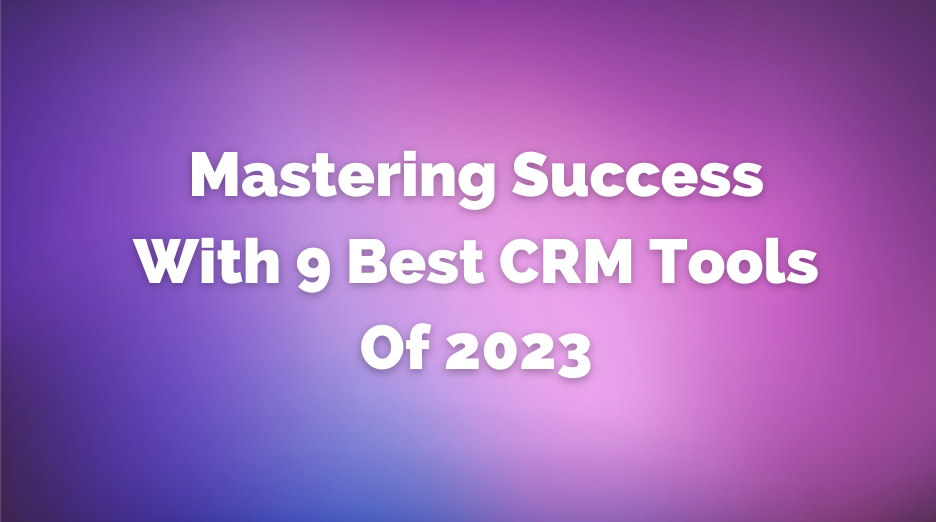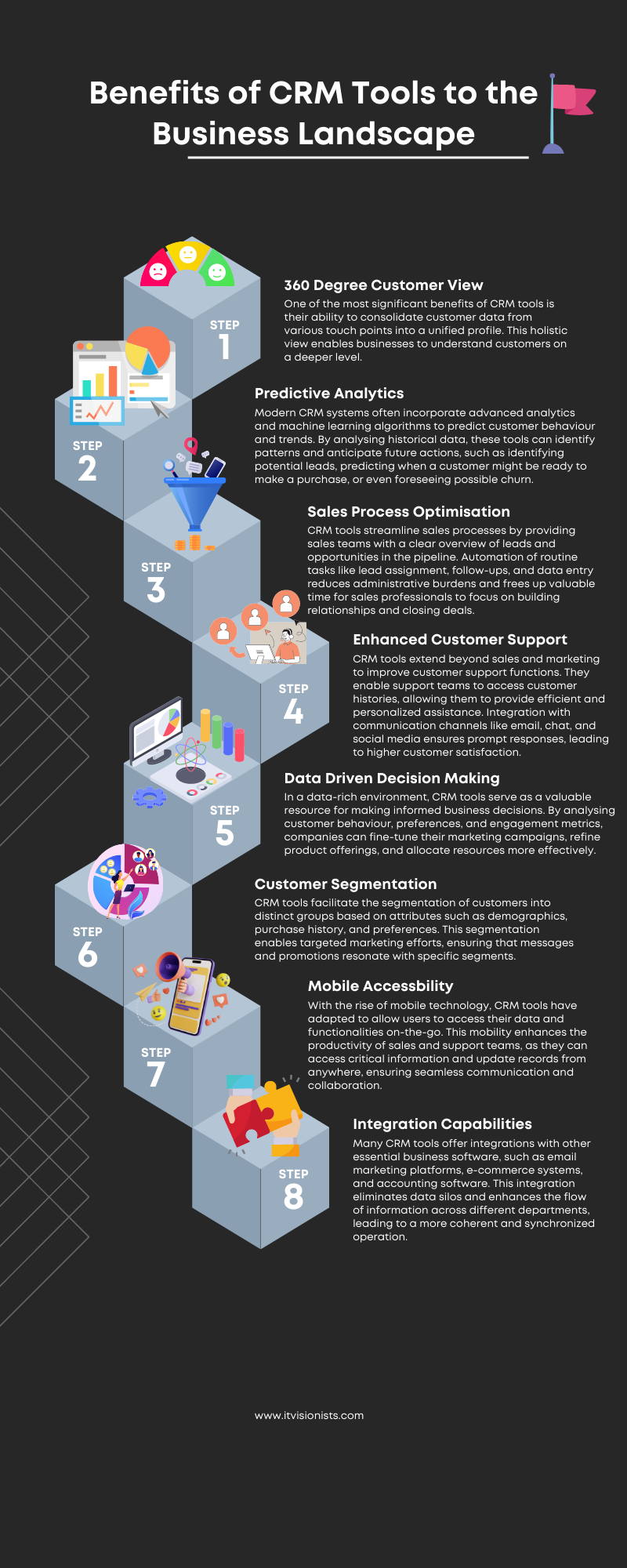
In the fast-paced and ever-evolving landscape of modern business, the significance of Customer Relationship Management (CRM) tools cannot be emphasized enough. Gone are the days when these tools were merely digital address books; today, they have metamorphosed into indispensable platforms that serve as the backbone of businesses. These platforms empower enterprises to decipher customer behaviour, streamline complex processes, and foster exponential growth.
In this comprehensive guide, we embark on a journey through the top Sales CRM tools of 2023, each one a catalyst for driving business triumphs and cultivating robust customer relationships. These tools surpass basic functionalities, extending their prowess to encompass data security, scalability, and the seamless integration of essential systems.
As we delve into the unique strengths of each CRM solution, the mosaic they collectively create is one of enhanced customer engagement and mastery in operational management.
Importance Of CRM In Modern Business
CRM tools have revolutionized the way businesses operate by providing a comprehensive solution for managing customer relationships and data. Their impact spans across sales, marketing, customer support, and decision-making processes. As technology continues to evolve, CRM tools are likely to become even more sophisticated, enabling businesses to further optimize their strategies and customer engagement efforts.
CRM tools empower businesses to analyse customer interactions, make data-driven decisions, and automate repetitive tasks. According to Business News Daily, many of the CRM Benefits from these tools result in increased sales, detailed analytics, automated processes, and personalized engagement – all vital components for modern business growth.
Let’s go through the various aspects of how CRM tools have transformed the business landscape:

360-Degree Customer View:
One of the most significant benefits of CRM tools is their ability to consolidate customer data from various touch points into a unified profile. This holistic view enables businesses to understand customers on a deeper level. By tracking their interactions, purchase history, communication preferences, and feedback, companies can tailor their offerings and communications to meet individual needs. This level of personalization fosters stronger customer relationships and drives brand loyalty.
Predictive Analytics:
Modern CRM systems often incorporate advanced analytics and machine learning algorithms to predict customer behaviour and trends. By analysing historical data, these tools can identify patterns and anticipate future actions, such as identifying potential leads, predicting when a customer might be ready to make a purchase, or even foreseeing possible churn. This empowers businesses to proactively address issues and seize opportunities.
Sales Process Optimization:
CRM tools streamline sales processes by providing sales teams with a clear overview of leads and opportunities in the pipeline. Automation of routine tasks like lead assignment, follow-ups, and data entry reduces administrative burdens and frees up valuable time for sales professionals to focus on building relationships and closing deals. Additionally, real-time tracking and reporting enable sales managers to identify bottlenecks, assess performance, and refine strategies for better outcomes.
Enhanced Customer Support:
CRM tools extend beyond sales and marketing to improve customer support functions. They enable support teams to access customer histories, allowing them to provide efficient and personalized assistance. Integration with communication channels like email, chat, and social media ensures prompt responses, leading to higher customer satisfaction. This comprehensive support experience contributes to overall customer retention.
Data-Driven Decision Making:
In a data-rich environment, CRM tools serve as a valuable resource for making informed business decisions. By analysing customer behaviour, preferences, and engagement metrics, companies can fine-tune their marketing campaigns, refine product offerings, and allocate resources more effectively. This data-driven approach minimizes guesswork and increases the likelihood of successful outcomes.
Customer Segmentation:
CRM tools facilitate the segmentation of customers into distinct groups based on attributes such as demographics, purchase history, and preferences. This segmentation enables targeted marketing efforts, ensuring that messages and promotions resonate with specific segments. By delivering relevant content, businesses can increase the effectiveness of their campaigns and drive higher conversion rates.
Mobile Accessibility:
With the rise of mobile technology, CRM tools have adapted to allow users to access their data and functionalities on-the-go. This mobility enhances the productivity of sales and support teams, as they can access critical information and update records from anywhere, ensuring seamless communication and collaboration.
Integration Capabilities:
Many CRM tools offer integrations with other essential business software, such as email marketing platforms, e-commerce systems, and accounting software. This integration eliminates data silos and enhances the flow of information across different departments, leading to a more coherent and synchronized operation.
Salesforce CRM
Salesforce CRM stands as a true titan in the CRM industry. With a history of innovation and a stronghold on the market, it offers a comprehensive suite of features designed to cater to diverse business needs. From lead management to sales automation and customer service capabilities, Salesforce CRM offers a wide range of functionalities that are critical for fostering positive customer relationships. The security of sensitive customer data is ensured through robust measures, building trust with clients, and aligning with GDPR and other regulations.
HubSpot CRM
HubSpot CRM has carved a niche for itself by being a user-friendly platform that boasts remarkable inbound marketing and sales capabilities. With a focus on contact management, deal tracking, and marketing automation tools, HubSpot CRM caters to businesses seeking to enhance their customer engagement. Its seamless integration with Google Workspace and other essential software ensures that businesses can work cohesively across their tech stack.
Zoho CRM
Zoho CRM is known for its feature-rich approach, catering to businesses of all sizes. Its cost-effectiveness combined with industry-specific solutions makes it an appealing choice. Integration with other Zoho applications further streamlines processes, promoting collaboration and improved workflow automation. The scalability of Zoho CRM allows businesses to grow without worrying about outgrowing their CRM solution.
Microsoft Dynamics 365
Microsoft Dynamics 365 is a comprehensive suite that seamlessly integrates CRM and ERP functionalities. Designed for medium to large enterprises, Microsoft Dynamics 365 provides advanced analytics and AI-driven insights. Integration with Microsoft products ensures smooth collaboration and data synchronization across departments. This feature-rich solution is a game-changer in understanding customer behaviours and streamlining business operations.
Pipedrive
Pipedrive stands out with its intuitive design focused on sales management and pipeline tracking. Ideal for small and medium-sized businesses, its visual pipeline management and email integration capabilities are noteworthy. Pipedrive simplifies sales pipeline management, making it easier to visualize, track, and optimize sales processes.
Freshworks CRM
Freshworks CRM introduces AI-based lead scoring and sales automation features, giving businesses the tools they need to streamline sales processes and efficiently manage leads. By automating repetitive tasks, Freshworks CRM allows sales and marketing teams to focus on value-added activities. This CRM solution is particularly beneficial for businesses looking to enhance their customer engagement and overall efficiency.
Insightly
Insightly presents a comprehensive CRM and project management tool that caters to small and medium-sized businesses. Its robust contact and project management features are complemented by seamless email integration. Insightly streamlines both customer relationships and internal project management, promoting better organization and collaboration.
SAP CRM
SAP CRM is the result of enterprise software provider SAP’s dedication to delivering cutting-edge solutions. With features spanning sales automation, marketing automation, customer service management, and analytics, SAP CRM is a one-stop solution for businesses seeking comprehensive support. Its integration capabilities with other SAP products streamline end-to-end business processes, enhancing customer interactions and driving growth across industries.
Monday.com as a CRM Solution
Monday.com is another remarkable addition to our list of top CRM tools. This versatile platform goes beyond traditional CRM functions, offering workflow automation, project management, and collaboration capabilities. While it might not be solely recognized as a CRM tool, its flexibility allows businesses to customize it to suit their customer relationship management needs. By streamlining internal processes and facilitating effective team collaboration, Monday.com contributes to improved customer engagement and satisfaction.
Which One Is Right For You?
Selecting the right CRM tool is a crucial decision for businesses. Each CRM solution addressed specific pain points, offering unique features that cater to diverse industries and needs. The scalability of these tools ensures they can adapt to changing business demands, enabling seamless growth. Pricing plans and subscription options vary, allowing businesses to align their CRM investment with their budget and expected ROI.
At IT Visionits, having worked with various CRM tools, we have found that the right CRM solution can indeed transform business operations. From gaining valuable insights into customer behaviours to automating routine tasks, these tools offer a competitive advantage that shouldn’t be overlooked.
Get The Best CRM Solutions
In conclusion, the CRM landscape in 2023 offers a wide range of options for businesses to choose from. By carefully assessing the features, scalability, integration capabilities, and pricing of these CRM tools, businesses can make informed decisions that will empower them to achieve their growth objectives. Whether it’s Salesforce CRM’s market dominance, HubSpot CRM’s user-friendliness, or SAP CRM’s comprehensive suite, the right CRM tool can redefine customer relationships and drive business success in today’s competitive landscape. And with the inclusion of Monday.com as a versatile CRM solution, businesses have even more choices to tailor their CRM strategies for optimal growth and customer satisfaction.
If you feel overwhelmed to choose the best fit CRM for your business and want to have it ready customised to your business needs, reach out to us today and we will be glad to help.
